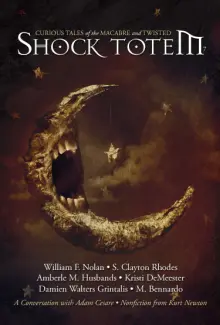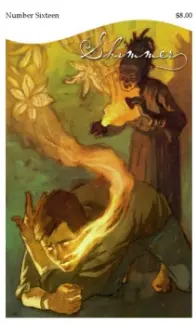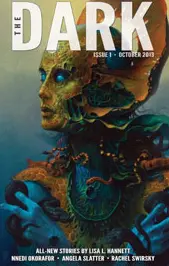I decided to do something a little different this column. I wanted to reach out to a few editors to get their thoughts on what they are looking for these days—what their magazine is all about—five quick, easy questions. I decided to select markets that have not only been elusive to me, for this first column, but also markets that I consider to be some of the best out there. Shock Totem publishes some of the most entertaining and layered horror I’ve read, and they’ve really become a favorite of mine. Shimmer taps into an emerging genre—magical realism—with great success, as well as more traditional fantasy. The third publication, The Dark, is a new venture profiling dark fiction, but one that shows great promise—so I thought adding in an emerging market might be fun as well. I hope you find their answers informative and helpful. And of course, be sure to submit to them, if you have something appropriate to send in.
NOTE: All statistics come from Duotrope.com and should NOT be considered 100% accurate for a variety of reasons. Check guidelines at each publication to be sure.
SHOCK TOTEM
 Ken Wood, Publisher / Editor-in-Chief
Ken Wood, Publisher / Editor-in-Chief
Genres: Fantasy, Horror, and Crime
Acceptance Rate: <1%
Pay Rate: .05/word
Average Response Time: 39 days
Length: Flash fiction up to 5,000 words
What makes a story a Shock Totem story?
This is the toughest question we’re asked. Probably because there is no right answer—and I like it that way. It really comes down to something simple and utterly ambiguous: we like what we like. And that may depend on our mood that day, what we’ve read or accepted recently, or any number of other variables.
People hate hearing that, I know; but really there is no better answer. I wish there were. All we can do is trust in ourselves, read with integrity, accept what moves us, and hope that it translates to readers.
Please tell us about a recent story (and author) you accepted—what made it stand out, what surprised or fulfilled you as a reader and editor, what made you say YES.
I don’t feel comfortable singling out a story from any of our upcoming issues, though all of them, on a certain level, fit the question. But I will mention Zero Lives Remaining, a novella by Adam Cesare that we’re publishing next spring. It’s a brilliant slab of 80s-inspired cinematic horror, as one might expect from Adam. Such an outstanding young writer, destined for the big leagues, and I’m really excited and honored to be able to publish this book.
If I may, the back cover copy:
Robby Asaro is dead.
And alive.
He’s a ghost in the machine, keeping a watchful eye on the arcade where he lost his life two decades before. The afterlife is good. The best thing ever to have happened to him. But when the conscious electric current formerly known as Robby Asaro makes a decision to protect Tiffany Park, one of his favorite patrons, from a bully, he sets loose a series of violent supernatural events that can’t be stopped.
Trapped inside the arcade as the kill count rises, Tiffany and a group of gamers must band together to escape from what used to be their favorite place on earth…and the ghost of Robby Asaro.
From the author of Tribesmen, Video Night, and The Summer Job, Zero Lives Remaining is a masterful mix of horror and suspense, dread and wonder, a timeless ghost story that solidifies Adam Cesare’s reputation as one of the best up-and-coming storytellers around. This is Adam Cesare firing on all cylinders—and he’s just getting started.
And the limited edition hardcover is going to be absolutely killer!
What story do you see way too often?
Poop stories. Kill-the-baby stories. They’re terrible. Poop is not shocking. Usually it’s just kind of gross. (And sometimes also hilarious.) Killing the baby is not shocking, either. Any time we get a post-apocalyptic tale that begins with a family preparing dinner, you know the baby at the table is dinner.
Then again, I’m sure someone out there has written a brilliant kill-the-baby or poop—or kill-the-baby and poop—story, but we haven’t seen it yet. Can’t say I’m all that disappointed.
What story do you never see that you’d love for somebody to submit?
Not that we never see this kind of story, but I’d love to read and accept an amazing vampire tale. Or a werewolf story.
What one bit of advice would you give a new and emerging author—about craft, the process, submissions, the industry, etc.
Respect your work enough to disagree with editors and constructive criticism, but not so much that you don’t listen or try new things. Too much ego is an albatross, but so is too little. Find the right balance, accept criticism and take it to heart, but be confident enough to know when it’s wrong. Especially when working with critique groups, which are often comprised of other authors who can’t separate how they write with how you write.
And have fun. Always have fun.
SHIMMER
 E. Catherine Tobler, Senior Editor
E. Catherine Tobler, Senior Editor
Genres: Fantasy, Science Fiction, and Horror
Acceptance Rate: <1%
Pay Rate: .05/word
Average Response Time: 10 days
Length: Flash fiction up to 7,500 words
What makes a story a Shimmer story?
Shimmer looks for a unique voice in its fiction. Our issues can end up reading like pose poetry. Shimmer has a distinctive tone; we tend to like stories that have an edge of melancholy. Beth [Wodzinski, Editor-in-Chief] once described Shimmer fiction as the moment from the song "Hallelujah," where "it's a cold and it's a broken," and there is still a light shining down through the darkness.
Please tell us about a recent story (and author) you accepted—what made it stand out, what surprised or fulfilled you as a reader and editor, what made you say YES.
"List of Items in Leather Valise Found on Welby Crescent," by Rachael Acks. Flash fiction is a super hard sell with me. I typically find that such short stories exist solely to tell a joke or support a pun at the end of the work. Rarely are they "Shimmery." But this piece is unique in its structure and tells a surprisingly heartbreaking story, in all of about 450 words. This will be in Shimmer #19.
What story do you see way too often?
While we see a lot of zombies, vampires, and werewolves, what we see more of is fiction that doesn't respect women as equals. Women are often slotted into roles where they are subservient, or exist only as objects of sexual desire. At Shimmer, we prefer to see female characters on equal footing with their male counterparts; we like fiction that represents women as the people they actually are.
What story do you never see that you’d love for somebody to submit?
Fiction that does something we haven't seen before. Stories that take risks, whether it be with structure or POV. Stories that challenge the reader to think in a new way.
What one bit of advice would you give a new and emerging author—about craft, the process, submissions, the industry, etc.
Keep going. A rejection doesn't mean anything more than "no, this doesn't fit what we need right now." It doesn't mean you're hopeless or that you can't write. You absolutely have to find the right fit for the project you're submitting. This is why there are dozens upon dozens of editors out there. Keep going.
THE DARK
 Jack Fisher, Editor
Jack Fisher, Editor
Genres: Fantasy, Science Fiction, and Horror
Acceptance Rate: <1%
Pay Rate: .05/word (up to 5,000 words)
Average Response Time: 1 day
Length: 1,000 – 5,000 words
What makes a story a Dark story?
A story strong in its voice with tones of the strange, fantastic or bizarre, or a mix of all three; subtle, literary horror/magic realism in a contemporary setting.
Please tell us about a recent story (and author) you accepted—what made it stand out, what surprised or fulfilled you as a reader and editor, what made you say YES.
From issue #1, “Another Mouth” by Lisa Hannett and from issue #2, Amanda E. Forrest’s story, “Five Boys Went to War” are prime examples of what we are. Immediately, both struck us as ominous and utterly strange.
What story do you see way too often?
Not necessarily one kind in particular, but I can tell you what I am not a fan of: zombie fiction.
What story do you never see that you’d love for somebody to submit?
Being always and forever a huge fan of the late Ray Bradbury’s work, I’d really love to see something written in that same poetic style, only much darker in plot.
What one bit of advice would you give a new and emerging author—about craft, the process, submissions, the industry, etc.
If you are going to write, you should be well-read first. You must devour reading of every kind: fiction, nonfiction, poetry, etc. (it will help establish style and voice), and, of course, an interesting idea for a story. Then, get used to rejection—it will harden you. Keep writing, take advice, fine-tune, resubmit.

About the author
Richard Thomas is the award-winning author of seven books: three novels—Disintegration and Breaker (Penguin Random House Alibi), as well as Transubstantiate (Otherworld Publications); three short story collections—Staring into the Abyss (Kraken Press), Herniated Roots (Snubnose Press), and Tribulations (Cemetery Dance); and one novella in The Soul Standard (Dzanc Books). With over 140 stories published, his credits include The Best Horror of the Year (Volume Eleven), Cemetery Dance (twice), Behold!: Oddities, Curiosities and Undefinable Wonders (Bram Stoker winner), PANK, storySouth, Gargoyle, Weird Fiction Review, Midwestern Gothic, Gutted: Beautiful Horror Stories, Qualia Nous, Chiral Mad (numbers 2-4), and Shivers VI (with Stephen King and Peter Straub). He has won contests at ChiZine and One Buck Horror, has received five Pushcart Prize nominations, and has been long-listed for Best Horror of the Year six times. He was also the editor of four anthologies: The New Black and Exigencies (Dark House Press), The Lineup: 20 Provocative Women Writers (Black Lawrence Press) and Burnt Tongues (Medallion Press) with Chuck Palahniuk. He has been nominated for the Bram Stoker, Shirley Jackson, and Thriller awards. In his spare time he is a columnist at Lit Reactor and Editor-in-Chief at Gamut Magazine. His agent is Paula Munier at Talcott Notch. For more information visit www.whatdoesnotkillme.com.








